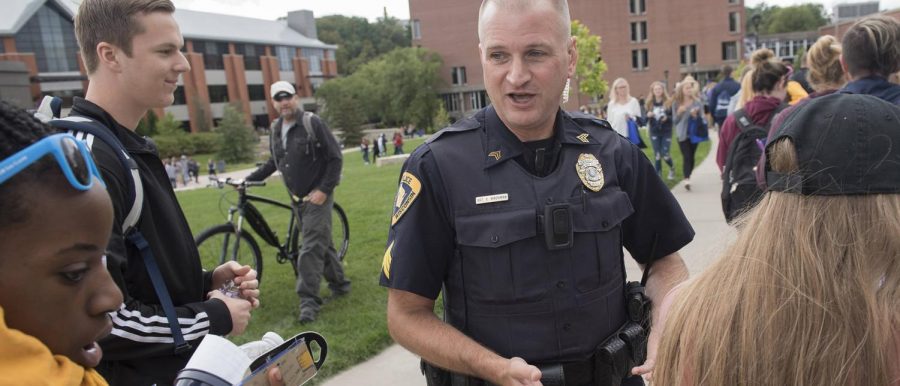UW-Eau Claire Police discuss campus safety
Members of the UW-Eau Claire police department and Risk Management and Safety Office discuss campus safety measures in wake of shootings in Wisconsin
Photo by Submitted Photo
To prepare for an incident like a shooting, the police department takes part in training alongside members of the county police force.
In the wake of two Wisconsin high school shootings — both of which were resolved without loss of life — Lieutenant Chris Kirchman of the UW-Eau Claire police department and Director Timothy Boehnen of the Risk Management and Safety Office shared insight regarding the security measures the university has in place in the case of an active shooter.
Because a public college campus is a different environment from a closed high school, Kirchman said the UW-Eau Claire police department employs some different strategies to prevent events like a shooting from happening.
“What we do at UW Eau Claire is attempt to encourage students, faculty and staff to report suspicious activities,” Kirchman said. “And that could be anything from a threat that they may see, to some unusual change in behavior or in someone’s actions.”
Kirchman said while students and faculty can report such observations to the police, it is also okay to report it to housing, the Dean of Students, or some other campus entity that can determine whether or not an issue is a police matter.
To prepare for an incident like a shooting, the police department takes part in training alongside members of the county police force. In May 2018 the UW-Eau Claire police force, alongside the Oakland County Sheriff’s department, the Eau Claire Fire Department, the County Emergency Management and Mayo and Sacred Heart hospitals took part in an active shooter exercise.
The exercise simulated an active shooter situation taking place in McPhee that allowed the departments to come together and practice a new technique, the Rescue Task Force concept, which is being used around the country, Kirchman said. The technique involves finding a way to get medical attention to victims who remain inside areas that may not yet be 100 percent safe for medical staff to reach.
“The fire department recently purchased ballistic helmets and ballistic vests that they can keep in their fire engines and ambulances, and they can put on to keep them safer when they’re going into these situations,” Kirchman said. “But it’s about saving lives. That’s the whole idea is how can we do it better.”
The situation was filmed so that they can create training videos for local law enforcement and fire departments. The departments train together, Kirchman said, so they can ensure everyone responds and reacts in the same way and as quickly as possible.
Kirchman said students have several ways in which they, too, can prepare themselves in the case of such an incident.
“We always tell students that, you know, we hope that students aren’t walking around campus being like afraid or scared,” Kirchman said. “We ask that they be alert. You know, be aware of your surroundings.”
Students should be careful to pay attention to what is going on around them, Kirchman said.
“We’re not saying you can’t listen to music and that you can’t walk through campus looking at your phone,” Kirchman said, “but glance up every once in a while.”
Another precautionary step students can take is to make sure they are signed up to both UW-Eau Claire and Eau Claire county’s emergency alert systems, Boehnen said.
UW-Eau Claire’s emergency alert system was created five years ago, Boehnen said. Because federal law prohibits UW-Eau Claire from texting cell phones without a person’s permission, the system is not automatically set up for all students. CampS prompts users to either opt in and give their information, or opt out.
“(Students) can choose the level of notifications that they want,” Boehnen said. “We will only use the system for severe emergencies on campus. We use our notification system very sparingly.”
When signing up, students have three different options for which notification settings they opt into: text message, voice line and e-mail. Boehen said he recommends students sign up for all three, as they are much more likely to notice their phone when all three are employed.
“The reason being is first of all, any of us, if we get a text message, we’re not going to check it in the middle of class,” Boehnen said. “And so what if your phone starts blowing up and you’re getting text messages, emails and voice messages going on? That’s going to cause me to check my phone.”
The emergency system in part works off of the policies outlined in The Clery Act, a consumer protection law that was made to ensure transparency regarding campus crime policy and statistics. Part of The Clery Law outlines what tasks a campus emergency notification system should accomplish.
According to the Clery Center’s website, when a crime covered by the Clery Act occurs, campus officials have to evaluate if there is a serious or ongoing threat to the campus community that would warrant a warning to be issued to all staff and students.
“In the event of an immediate, significant danger to the health or safety campus community (e.g. weather, disease outbreak), campus officials may issue an emergency notification,” the website states. “This notification can include the entire campus, or be limited to a specific area deemed to be at risk.”
Boehnen also said he recommended students sign up for the Eau Claire County alert system via their website, so that they are kept aware of any safety issues that may occur outside of campus.
There are several types of trainings that students and faculty can take part in to prepare for such an emergency on campus. One of these is ALICE training — a technique typically used in elementary through high schools that teaches students and faculty how to respond in the case of an active shooter.
Another type of training the police department offers, in conjunction with Recreation and Sport Operations, is self defense classes. The classes are free and open to all students several times throughout the semester. It includes basic self-defense and is open to up to 15 individuals.
Kirchman said the police department is open to giving trainings on whatever issues a department or group may deem important. He said when someone asks for a presentation, the department typically accommodates for it and prepares material.
“What we tell people is if you have a request for training, give us a call,” Kirchman said. “If we can’t accommodate it, we’ll try to get you in touch with somebody who can.”
Kopke can be reached at [email protected].

Lea Kopke is a fourth-year journalism and German student. This is her seventh semester on The Spectator staff. She plays the clarinet in the Blugold Marching Band and recently relearned how to ride a bike with no hands.

